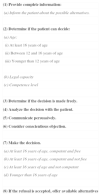Refusal to medical interventions is non-acceptance, voluntary and free, of an indicated medical intervention. What should the physician do in case of refusal? It is understandable that the rejection of a validated medical intervention is difficult to accept by the responsible physician when it raises the conflict of protection of life versus freedom of choice. Therefore it is important to follow some steps to incorporate the most relevant aspects of the conflict. These steps include: (1) giving complete information to patients, informing on possible alternatives, (2) determining whether the patient can decide (age, competency and level of capacity), (3) ascertaining whether the decision is free, (4) analyzing the decision with the patient, (5) persuading, (6) if the patient kept in the rejection decision, consider conscientious objection, (7) taking the decision based on the named criteria, and (8) finally, if the rejection is accepted, offer available alternatives.
El rechazo a las actuaciones médicas es la no aceptación, voluntaria y libre, de una intervención médica indicada. ¿Qué debe hacer el médico ante el rechazo? Es comprensible que el rechazo a una actuación validada sea difícil de aceptar por el médico responsable cuando plantea el conflicto protección de la vida versus la libertad de elección. Por ello es importante seguir unos pasos que incorporen los aspectos más relevantes del conflicto. Estos pasos pueden ser: 1) dar información completa al paciente, informando sobre las posibles alternativas, 2) determinar si el paciente puede decidir (edad, capacidad legal y grado de competencia), 3) comprobar si la decisión es libre, 4) analizar la decisión con el paciente, 5) persuadirle, 6) si se mantiene en la decisión de rechazo, considerar la objeción de conciencia, 7) tomar la decisión en base a los criterios nombrados, 8) finalmente, si se acepta el rechazo, ofrecer las alternativas disponibles.
Article
Diríjase desde aquí a la web de la >>>FESEMI<<< e inicie sesión mediante el formulario que se encuentra en la barra superior, pulsando sobre el candado.

Una vez autentificado, en la misma web de FESEMI, en el menú superior, elija la opción deseada.

>>>FESEMI<<<








